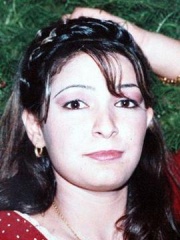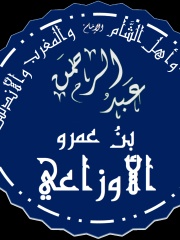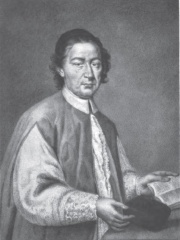RELIGIOUS FIGURE
Aïda Yazbeck

 Aïda Yazbeck
Aïda Yazbeck
Sister Aïda Yazbeck (Arabic: عيدا يزبك) is a Catholic nun who is the Director of the Al-Mouna Cultural Center in N'Djaména, Chad. Her work focuses on educating international and domestic groups as well as NGOs about conflicts between different groups in Chad. By training people in conflict resolution, Sister Yazbeck's organization seeks to promote respect among culturally different groups and foster peace in all aspects of life. Read more on Wikipedia
Her biography is available in 15 different languages on Wikipedia. Aïda Yazbeck is the 3,123rd most popular religious figure, the 159th most popular biography from Lebanon and the 19th most popular Lebanese Religious Figure.
Aïda Yazbeck is a Chadian nun known for her dedication to education and social work within her community. She has been influential in promoting women's rights and improving access to education for girls in Chad.
Memorability Metrics
Page views of Aïda Yazbeck by language
Among RELIGIOUS FIGURES
Among religious figures, Aïda Yazbeck ranks 3,123 out of 3,187. Before her are Nouman Ali Khan, Gian Franco Saba, Khadim Hussain Rizvi, Julian Leow Beng Kim, Murder of Du'a Khalil Aswad, and Detention of Pavel Pernikaŭ. After her are Hamza Yusuf.
Most Popular Religious Figures in Wikipedia
Go to all RankingsNouman Ali Khan
1978 - Present
HPI: 41.47
Rank: 3,117
Gian Franco Saba
1968 - Present
HPI: 40.66
Rank: 3,118
Khadim Hussain Rizvi
1966 - 2020
HPI: 40.53
Rank: 3,119
Julian Leow Beng Kim
1964 - Present
HPI: 40.52
Rank: 3,120
Murder of Du'a Khalil Aswad
HPI: 39.82
Rank: 3,121
Detention of Pavel Pernikaŭ
HPI: 35.78
Rank: 3,122
Aïda Yazbeck
HPI: 34.76
Rank: 3,123
Hamza Yusuf
1958 - Present
HPI: 29.53
Rank: 3,124
In Lebanon
Among people born in Lebanon, Aïda Yazbeck ranks 159 out of 145. Before her are Zeina Abirached (1981), Hayat Mirshad (null), Joe Hachem (1966), Rima Fakih (1985), Nour El-Refai (1987), and Mohamad Ghaddar (1984). After her are Abbas Hassan (1985), Karl Wolf (1979), Safwan Khalil (1986), Gabriella Doueihy (1999), Ray Bassil (1988), and Noureddine Hadid (1993).
Others born in Lebanon
Go to all RankingsZeina Abirached
WRITER
1981 - Present
HPI: 39.81
Rank: 153
Hayat Mirshad
SOCIAL ACTIVIST
HPI: 39.57
Rank: 154
Joe Hachem
POKER PLAYER
1966 - Present
HPI: 39.55
Rank: 155
Rima Fakih
CELEBRITY
1985 - Present
HPI: 39.46
Rank: 156
Nour El-Refai
ACTOR
1987 - Present
HPI: 36.45
Rank: 157
Mohamad Ghaddar
SOCCER PLAYER
1984 - Present
HPI: 34.89
Rank: 158
Aïda Yazbeck
RELIGIOUS FIGURE
HPI: 34.76
Rank: 159
Abbas Hassan
SOCCER PLAYER
1985 - Present
HPI: 34.61
Rank: 160
Karl Wolf
SINGER
1979 - Present
HPI: 34.37
Rank: 161
Safwan Khalil
ATHLETE
1986 - Present
HPI: 25.74
Rank: 162
Gabriella Doueihy
SWIMMER
1999 - Present
HPI: 22.43
Rank: 163
Ray Bassil
ATHLETE
1988 - Present
HPI: 21.25
Rank: 164
Noureddine Hadid
ATHLETE
1993 - Present
HPI: 19.64
Rank: 165
Among RELIGIOUS FIGURES In Lebanon
Among religious figures born in Lebanon, Aïda Yazbeck ranks 19. Before her are Nasrallah Boutros Sfeir (1920), Abd al-Rahman al-Awza'i (707), Hashem Safieddine (1964), Aram I (1947), Giuseppe Simone Assemani (1686), and Anthony Peter Khoraish (1907).
Nasrallah Boutros Sfeir
1920 - 2019
HPI: 62.29
Rank: 13
Abd al-Rahman al-Awza'i
707 - 774
HPI: 62.04
Rank: 14
Hashem Safieddine
1964 - 2024
HPI: 60.69
Rank: 15
Aram I
1947 - Present
HPI: 60.27
Rank: 16
Giuseppe Simone Assemani
1686 - 1768
HPI: 57.17
Rank: 17
Anthony Peter Khoraish
1907 - 1994
HPI: 55.84
Rank: 18
Aïda Yazbeck
HPI: 34.76
Rank: 19

























